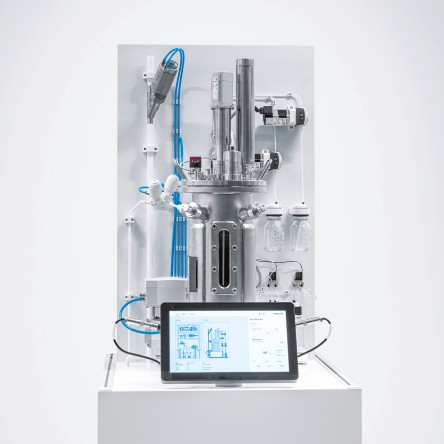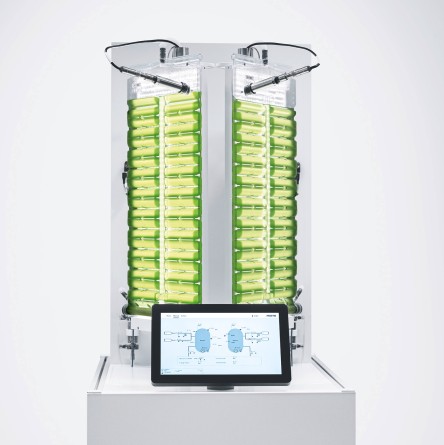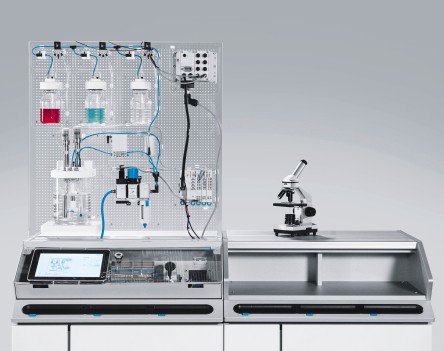Optimised conditions for cultivating microogranisms
To provide microorganisms such as bacteria, algae and yeasts with the right growing environment so they can achieve a high biomass, the ambient conditions in the reactor must be exactly right. This means many variables need to be measured, recorded and controlled.
In addition to the temperature and pH value, the supply of nutrients the and precise gassing of air, oxygen and other gases play a central role. Festo provides components and solutions from sectors such as gas handling, liquid handling and control technology as well as solutions up to and including ready-to-install control cabinets.

Bioreactor:
Highlight products and their function
Here we show a stainless steel bioreactor that is frequently used in industrial biotechnology.
Gas handling: precise flow control
The mass flow controllers VEMD are used to dose the gases. In addition to air, nitrogen, CO2 and in particular oxygen are used.
Liquid handling: precise dosing using overpressure
The pressure-over-liquid method is used to dose the liquid media in the reactor via the proportional-pressure regulator VEAB. The valve is used to pressurise a media container. The overpressure causes the medium to enter the reactor.
The media separated solenoid valve VYKA controls even minute quantities extremely precisely and is also suitable for aggressive substances such as alkalis, acids and other chemicals.
The FDA-compliant ball valve VZBD, which is activated by the quarter-turn actuator DFPD and positioner CMSX, is used to control the temperature of the reactor.
Control: automated control of all parameters
The controller CPX-E controls the components in the reactor, thereby automatically regulating the pH value, temperature and other factors that influence the growth of the microorganisms. It is also possible to connect to a control system using the MTP standard.
The operating screen CDPX displays the appropriate dashboard for operating the bioreactor via touchscreen.

Algae reactor:
Highlight products and their function
Photosynthesis is a central metabolic process that makes algae grow. During this process, CO2 is converted into sugar and oxygen is released. The two 6 litre flat-panel airlift photobioreactors (FPA) from Subitec enable the productive cultivation of microalgae through the optimal use of light, CO2 and nutrients.
Gas handling: two concepts for gassing
The application shows two methods of controlled gassing: on the one hand, one mass flow controller VEMD each is used to supply the precise amount of air and CO2 to the reactor.
On the other hand, gassing is controlled using the pressure regulator VEAA together with the flow sensor SFAH. This measures the actual amount of CO2 and air.
Liquid handling: food-safe valve technology
The pneumatically actuated food-safe pinch valve VZQA is used for filling and emptying the reactor or for sampling.
Control: new products in application
These valves are controlled by the new valve terminal VTUX. The CPX-E controls and regulates the components in the reactor, thus automatically regulating the pH value, temperature, gassing and light.
Always the right solution
In addition to individual components, Festo also offers customised system solutions for bioreactors. Certain components were selected for the development of customised automation solutions, for example in the form of complete control cabinets. Customised software can also be created, from the control system to the cloud. The seamless integration of the systems and the ability to analyse data in real time enable efficient and transparent process control.
Biologisation as a training field
Festo is not only meeting the new challenges in the field of biologisation from a technical point of view, but as a market leader in vocational basic and further training, it is also keeping an eye on the qualifications required in the future.
That is why, as part of its own vocational training programme, Festo has launched the "Climate Protection and Sustainable Development" specialist qualification together with the Stuttgart Region Chamber of Industry and Commerce. It is aimed at training many professions. There will be an "Automation of Biological Transformation" module especially for industrial/technical and commercial trainees.
Festo will manage parts of this in its own training centre and will start with its own trainees. In addition, Festo is developing a modular training concept for prospective biomechatronics engineers that can be used to impart knowledge, especially technical fundamentals.
There are also specific plans for higher education. We are currently working with Reutlingen University to design a new biomechatronics degree course that combines biological and technical content with a focus on the cell as the world's smallest factory. The new training reactor will also be used.
Learning reactor: modular system for biomechatronics engineers
In addition to the development of new job profiles, Festo has designed a modular training concept for prospective biomechatronics engineers that can be used to impart knowledge, especially technical fundamentals. The system consists of training software and various training hardware components housed in a modular carrier system.

Training software: the training software is a prototype based on the tried-and-tested Festo LX learning platform, which conveys the content in a playful way and prepares learners for the exercises.
Training hardware: the supplementary hardware consists of a bioreactor for cultivating yeasts and applications for taking samples. The system also incorporates two Festo Didactic products: the control cabinet of the SkillsConveyor, which is already available, and the electeo training system, which will be presented for the first time at the Hannover Messe.
Support system: the training system consists of five modules and can be expanded and combined with other modules as required. The bevelled shape of the integrated elements makes learning into an ergonomic process.